{:de}Vom 22. bis 28. April fand sie erneut statt – die Fashion Revolution Woche. Die globale Bewegung, die ihren Ursprung im Einsturz des Gebäudes Rana Plaza in Bangladesch im Jahr 2013 hat, jährt sich damit bereits zum 6.Mal. 1138 Menschen kamen damals ums Leben, mehr als 2500 Menschen wurden verletzt – und weltweit bekam die traurige Realität der globalen Modeindustrie plötzlich ein Bild. Seitdem zielt die Fashion Revolution Bewegung auf eine Veränderung der Textilindustrie, in der tagtäglich Tausende von Menschen unter menschenunwürdigen Umständen arbeiten. 6 Jahre nach der Katastrophe, die sie ausgelöst hat, ist Fashion Revolution größer denn je. Aber was hat sich für die Menschen vor Ort wirklich verändert?
Unsere Kleidung hat eine lange Reise hinter sich, bevor sie in die Regale der Geschäfte gelangt, und ist dann bereits durch die Hände von Baumwollbauern, Spinnern, Webern, Färbern und anderen gegangen. Etwa 75 Millionen Menschen weltweit arbeiten an der Herstellung unserer Kleidung. 80% von ihnen sind Frauen im Alter zwischen 18 und 35 Jahren. Die Mehrheit der Menschen, die Kleidung für den Weltmarkt herstellen, lebt jedoch in Armut, da sie nicht in der Lage sind, sich lebensnotwendige Güter zu leisten. Viele sind Opfer von Ausbeutung, verbalem und körperlichem Missbrauch, arbeiten unter unsicheren und unhygienischen Bedingungen und mit sehr geringem Verdienst. Und wir reden hier von 2019.
Wir glauben, dass die gesamte Modebranche einen radikalen Paradigmenwechsel braucht und dass sich die Art und Weise, wie wir Kleidung produzieren und konsumieren, grundlegend verändern muss. Seit 2013 setzt sich die Fashion Revolution Bewegung für eine transparentere, sicherere und ethischere Produktion in der Modebranche ein. Zum Beispiel, indem sie Menschen weltweit dazu bringt, ihre Kleidung auf links zu tragen und Marken zu fragen: „Who made my clothes?“. Obwohl die Anzahl der Antworten wächst, sind die Probleme der Branche noch lange nicht gelöst. Deshalb schließen sich Menschen weltweit jedes Jahr im April zusammen, um mit einer Vielzahl von kreativen Aktionen zu zeigen, dass wir nur gemeinsam einen Wandel herbeiführen können.
Hamburg – Fashion Revolution move
Auch in unserer Hometown Hamburg gab es dieses Jahr jede Menge Aktionen. Von Kleidertauschparties über Paneldiskussionen, Expertengesprächen und einem Dokumentarabend war jede Menge Input dabei. Eine Neuerung aber krönte die Woche: denn erstmals fand in Hamburg ein Fashion Revolution Move statt. Das Thema des Moves war Denim. Begleitet vom Ausruf „Deine Jeans macht Politik“ hätte dieses Thema nicht besser zu uns passen können! Denn Denim ist nach wie vor eines der umweltschädlichsten und kurzlebigsten Textilien in der Modebranche.
Deshalb gingen am 27.4.2019 viele viele Hamburger auf die Straße. Um für eine faire, umweltfreundliche und respektvolle Modebranche zu demonstrieren. Denn das Thema, so elitär es auch erscheinen mag, geht uns alle an. Schließlich sind Klimawandel und feministische Themen in der Bekleidungsindustrie – einer riesigen Wirtschaftsmacht – eng miteinander verwoben. Wir bekommen Gänsehaut, wenn wir sehen, welche Kraft sich aus einem gemeinsamen Mindset entfalten kann. Und wie großartig es ist zu wissen, dass wir in unserem Kampf für eine Fair Fashion oder Slow Fashion Bewegung nicht allein sind.
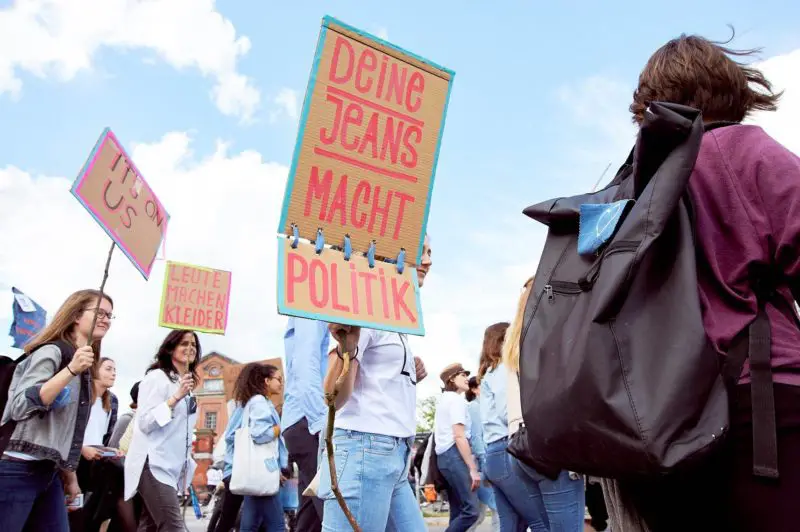
Bildrechte: Lena Scherer
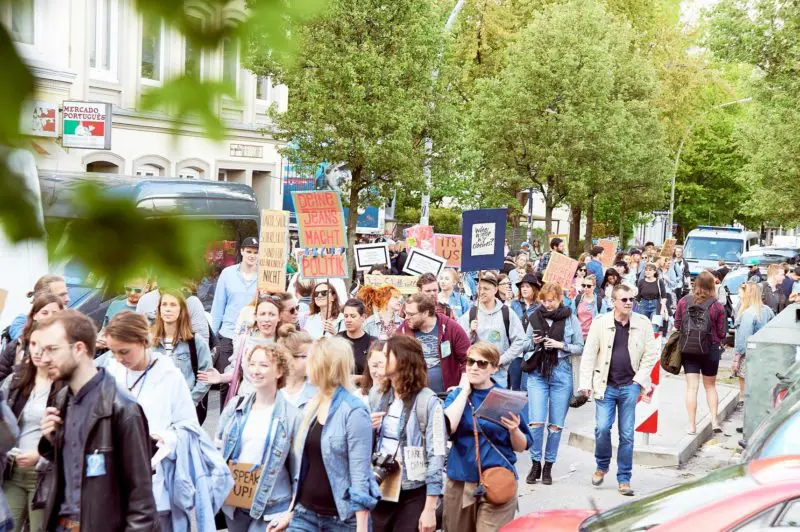
Bildrechte: Lena Scherer

Bildrechte: Lena Scherer
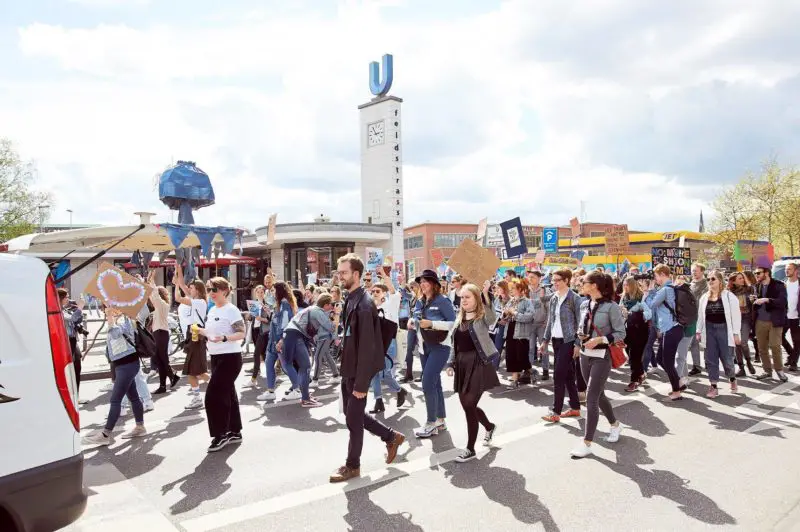
Bildrechte: Lena Scherer

Bildrechte: Lena Scherer
Schaut euch hier einen kleinen Film zum Move an.
Hang me up!
Der Move führte an einigen der Fashion Stores in Hamburg vorbei, die es bereits anders machen und versuchen, etwas zu bewegen, wie Glore, B-Lage und Captain Svensson. Wir waren mit Bridge&Tunnel bei der Endstation des Moves bei Werte Freunde am Start, wo es – wie sollte es anders sein – einen Denim Upcycling Workshop mit uns gab. Denn für uns ist Upcycling eine von vielen Möglichkeiten, zu einer faireren und langsameren Modeszene beizutragen.
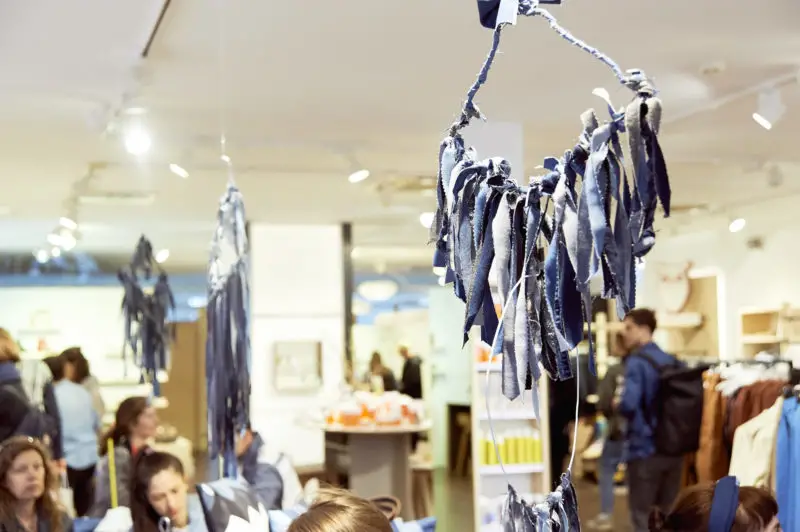
Bildrechte: Lena Scherer
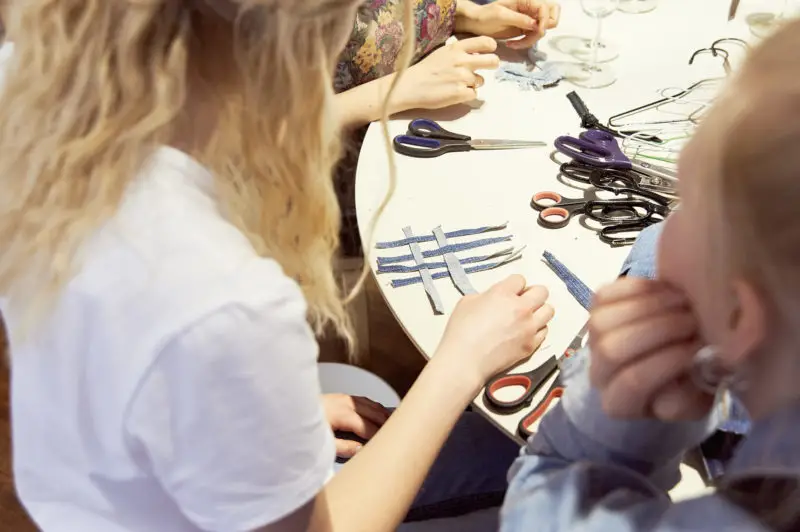
Bildrechte: Lena Scherer
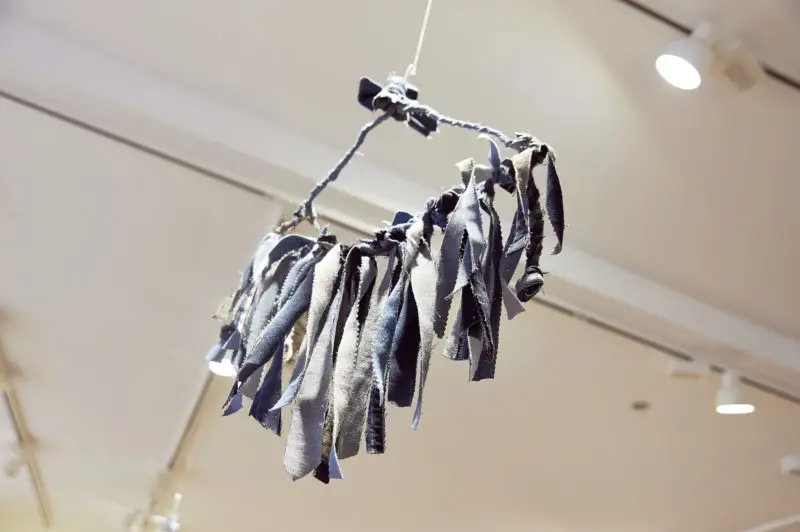
Bildrechte: Lena Scherer
Let’s get political!
Wir blicken auf eine Woche voller Inspiration, Denkanstöße und ernstgemeintem Engagement zurück. Auch wenn wir immer noch nicht dort sind, wo wir sein sollten. Zwar ist Fashion Revolution in 90 Ländern aktiv und hat allein im vergangenen Jahr mit ihrer Kampagne 275 Millionen Menschen offline und online erreicht, das sind 83% mehr als im Jahr zuvor. Auch der Transparenzindex der großen Unternehmen stieg in den letzten zwei Jahren um 9% und der Durchschnitt der größten 300 Unternehmen auf 21% (lest mehr dazu bei der Konsumentin). Doch so wichtig Transparenz und eine offene Diskussionskultur sind, so begrenzt reichen sie an dieser Stelle aus.
Wir müssen das Thema noch politischer angehen! Als Verbraucher in Deutschland würden wir nie im Traum daran denken, Unternehmen die Aufgabe zu übertragen, Menschenrechte auf nationaler Ebene zu schützen. Das ist eindeutig eine Aufgabe des Staates. Absurderweise akzeptieren wir jedoch in der Modebranche die Tatsache, dass sich Unternehmen freiwillig (!) dazu verpflichten, bestimmte internationale Arbeitsnormen einzuhalten, um damit die Menschen- und Arbeitsrechte von Produzenten in Entwicklungsländern zu schützen.
Im Jahr 2014 initiierte die Bundesregierung das Textilbündnis, einen freiwilligen Zusammenschluss von Unternehmen, Handel, NGOs und Gewerkschaften, deren Mitglieder individuelle Maßnahmen zur Verbesserung der textilen Lieferketten entwickeln. Ende 2016 zählte die Textil-Allianz 200 Mitglieder. Inzwischen zählt es nur noch 120 Mitglieder, denn mittlerweile ist das Textilbündnis in die Phase der Verbindlichkeit übergetreten.
Im vergangenen Jahr, am 24.04.2018, startete die FOLKDAYS-Gründerin Lisa Jaspers die Petition „Stopp Unternehmen, die Menschenrechtsverletzungen akzeptieren“. Innerhalb kürzester Zeit unterschrieben mehr als 110.000 Menschen. Ein Jahr ist vergangen, und es ist immer noch schwierig, wenn nicht gar unmöglich, deutsche Unternehmen für Menschenrechtsverletzungen in den Ländern, in denen sie produzieren, verantwortlich zu machen. Es bestehen noch keine Sorgfaltspflichten. Daher geht die Petition nun in die zweite Ausgabe.
Lisa Jaspers sowie zahlreiche UnterstützerInnen fordern die Bundesregierung erneut auf: Zeigt Verantwortung! Die Forderung wird von dem Hashtag #fairbylaw begleitet. Die Petition ruft Angela Merkel und die zuständigen Ministerien auf, sich nicht länger hinter unverbindlichen Textilbündnissen und Aktionsplänen zu verstecken, sondern Gesetze zu schaffen. Deutsche Unternehmen müssen für Menschenrechtsverletzungen in ihren eigenen Lieferketten verantwortlich gemacht werden.
Unser Nachbarland Frankreich zeigt, wie es geht: Dort wurde bereits vorletztes Jahr ein Gesetz über unternehmerische Sorgfaltspflichten verabschiedet, welches in seiner Bedeutung und Tragweite für die Menschenrechte in der Textilindustrie bisher einzigartig ist. Die Petition von Lisa Jaspers fordert dasselbe für Deutschland! Wenn ihr es noch nicht getan habt, unterschreibt hier!
In der Zwischenzeit kämpfen wir mit Bridge&Tunnel weiterhin für eine fairere Modebranche, um sagen zu können „I made your clothes“.
{:}{:en}From the 22th until the 28th of April we celebrated Fashion Revolution week. The global movement started after the collapse of the Rana Plaza building in Bangladesh in 2013. This disaster, which killed 1138 and injured more than 2500 people working in the textile industry, drew huge attention to the sad reality of the global fashion industry. Since then, the Fashion revolution movement has been aiming to change the textile industry, in which production is outsourced to low-wage countries where thousands of people work under terrible circumstances. Six years after the disaster that initiated it, the Fashion Revolution movement is bigger than ever. But what has really changed for the workers on site?
Our clothes have gone on a long journey before they hit store shelves, passing through the hands of cotton farmers, spinners, weavers, dyers, sewers and others. Approximately 75 million people work to make our clothes. 80% of them are women between the ages of 18 and 35. However, the majority of the people who make clothes for the global market live in poverty, unable to afford life’s basic necessities. Many are subject to exploitation; verbal and physical abuse, working in unsafe and dirty conditions, with very little payment. And this is 2019.
We believe that the whole fashion industry needs a radical paradigm shift and that the way that we produce and consume clothes needs to be transformed essentially. So every year the Fashion Revolution movement speaks up for a more transparent, safe and ethical production process in the fashion industry. For instance by making people worldwide turn their clothes inside out and ask brands ‘Who made my clothes?’. Although the number of responses is growing, the problems of the industry are far from being solved. That’s why every year in April, people worldwide come up with a variety of actions to show governments and citizens that we are all in this together.
Hamburg – Fashion Revolution move
There were plenty of activities in Bridge&Tunnel’s hometown Hamburg. People took part in clothes swap events, plenary discussions, expert-talks and a documentary night. All the activities were wrapped up with something new this year: a Fashion Revolution Move on Saturday. The theme of the walk was denim. Accompanied by the shoutout “Your jeans make politics!“ this topic couldn’t have fitted us better! After all, denim is still one of the most polluting and short-lived textiles in the fashion industry.
That’s why many people from Hamburg took to the streets. To demonstrate for a fair, environmentally friendly and respectful fashion industry. Because the topic, as elitist as it may seem, really does concern all of us. After all, climate change and feminist issues are closely linked in the garment industry – a huge economic power. We get goosebumps when we see what power can unfold from a shared mindset. And how great it feels to know that we are not alone in our fight for a slower and fairer fashion industry.

Bildrechte: Lena Scherer

Bildrechte: Lena Scherer

Bildrechte: Lena Scherer

Bildrechte: Lena Scherer

Bildrechte: Lena Scherer
Watch a movie of the move here.
Hang me up!
The move passed some of the fair fashion stores in Hamburg that already try to make a difference, like Glore, B-Lage and Captain Svensson. We set ourselves up at the final station, Werte Freunde, where we organized a denim wall hanging workshop. Participants were invited to bring their own old jeans and repurpose them. They took inspiration from the examples crafted by the Bridge&Tunnel team, but used their own creativity to make their unique wall hangings. Because as important as it is to change working conditions in the fashion industry worldwide, it is also so important to use existing resources. For us, upcycling is one way of contributing to a fairer and slower fashion scene.

Bildrechte: Lena Scherer

Bildrechte: Lena Scherer

Bildrechte: Lena Scherer
Let’s get political!
We look back on an inspiring Fashion Revolution week. However, we are still not where we should be. The international movement is active in 90 countries and has already achieved a lot. Last year alone, the campaign reached 275 million people offline and online, which is 83% more than in the year bfore. Also, the Transparency Index of large companies increased by 9% in the last two years and the average for the largest 300 companies rose to 21% (source: Fashion Revolution Transparency Index 2019). Media turmoil and increasing transparency of companies are above all discursive, but far from enough!
That’s why we urgently have to take the topic to the parliaments! As consumers in Germany, we would never dream of entrusting companies with the task of protecting our human rights on a national base. This is clearly a task of the state. Absurdly, however, in the fashion industry we accept the fact that companies commit themselves to adhere to certain international labour standards and thus to protect the human and labour rights of producers in developing countries.
In 2014, the German government initiated the Textile Alliance, a voluntary association of companies, trade, NGOs and trade unions, whose members have been developing individual measures to improve the textile supply chains. At the end of 2016, the Textile Alliance had 200 members. But by now it has only 120 members, because the Textile Alliance has entered the binding phase.
Last year, on 24.04.2018, FOLKDAYS founder Lisa Jaspers therefore started the petition „Stop companies who accept human rights abuses”. Within a very short time, more than 110,000 people signed. One year has passed and it is still difficult, if not impossible, to hold German companies responsible for human rights violations in the countries they produce in. There are still no due diligence obligations. Therefore, the petition now goes to the second edition.
Lisa Jaspers as well as numerous supporters demand the German Federal government again: show responsibility! The demand is accompanied by the Hashtag #fairbylaw. The petition calls Angela Merkel and the responsible ministries to finally get their act together. Germany can no longer hide behind non-binding textile alliances and action plans, but must create laws. German companies must be blamed for human rights violations in their own supply chains.
Our neighbour France gives the right example: last year they passed a law on corporate due diligence that is unique in its significance and scope for human rights in the textile industry. Lisa Jaspers’ petition demands the same for Germany! If you haven’t yet, sign it here!
In the meantime, Bridge&Tunnel will continue to contribute to a more fair fashion industry, so we can say: “I made your clothes”.
{:}

